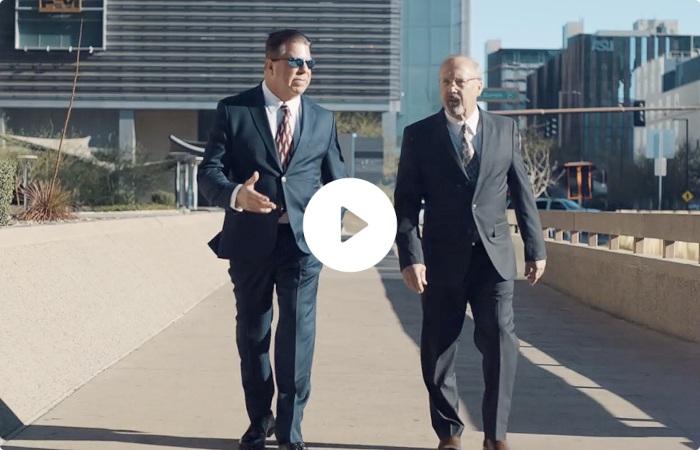
Cerebral palsy is an illness that, depending on its severity, can affect the movement, muscle tone, and posture of the patient. There are many types and various causes of cerebral palsy, but it is most often caused by damage to the developing brain before or during birth.

The signs and symptoms of cerebral palsy can appear during infancy or as late as the preschool years. severe cases can lead to impaired movement, abnormal reflexes, floppy or rigid limbs, abnormal posture, sudden movements, difficulty walking, or a combination of the above. People who suffer from cerebral palsy can also have problems swallowing, may have difficulty focusing their vision, and can also be accompanied by epilepsy, blindness, or deafness.
For more information contact our Missouri cerebral palsy lawyer today!
Types of Cerebral Palsy
Different types of cerebral palsy affect different parts of the brain, and each type can cause different disorders. The main types of cerebral palsy are as follows:
- Spastic cerebral palsy, which affects about 80% of all cerebral palsy patients, causes stiff muscles and makes it difficult to walk.
- Dyskinetic cerebral palsy leads to issues with controlling body movements, as well as involuntary and abnormal movements in the hands, arms, and legs.
- Hypotonic cerebral palsy, which reduces muscle tone and causes the arms and legs to move very easily and in a floppy fashion much like a rag doll.
- Ataxic cerebral palsy is an uncommon type of cerebral palsy that is characterized by disorganized or clumsy movements. It can lead to problems with walking, grasping objects, and writing.
"If your child was born with a birth injury, or cerebral palsy, we can help."
Causes
Cerebral palsy is caused by abnormal or damaged brain development. In many cases, the cause is not known, but some factors that can lead to a high risk for cerebral palsy include all of the following:
- Gene mutations that cause abnormal brain development
- Infections in the mother that affect the unborn child
- A disruption in the blood supply to the brain of the unborn baby
- Infant infections that lead to inflammation in or around the brain
- Traumatic head injuries to the baby in the womb, during birth, as a result of the incorrect use of birth-related assistive devices, or after birth in a vehicle or activity-related accident
- Insufficient oxygen reaching the baby’s brain as a result of infection or physical complications such as entanglement with the umbilical cord
Independence Cerebral Palsy Lawyer Near Me (800) 222-9529
Diagnosing Cerebral Palsy
If your child or loved one exhibits any of these signs, he or she may suffer from cerebral palsy.
- Stiff or floppy muscles
- Difficulty balancing
- Slow, writhing movements
- Missing important motor-skill milestones such as sitting up, crawling, or standing
- Excessive drooling or difficulty with swallowing
- Learning difficulties
- Seizures
Cerebral palsy can affect the entire body, or it may be limited to one limb or one side of the body. The disorders that cause cerebral palsy generally do not change over time so the patient’s symptoms usually do not deteriorate with age.
"We know first-hand what you are going through."
Life-Long Complications
The long-term outlook of patients with cerebral palsy depends on the disabilities and symptoms they suffer from. Specifically, as it pertains to muscle issues, cerebral palsy can lead to a wide range of complications during childhood or in adulthood, such as:
- A shortening of the muscles as a result of tightening. This is called contracture and it can inhibit bone growth, cause the bones to bend, and can result in joint deformities.
- The strain that cerebral palsy places on the body of the affected individual can lead to premature aging.
- Problems with feeding or swallowing make it difficult for patients with cerebral palsy to get the nutrition they need, especially infants. This impairs growth, weakens bones, and may require feeding via tubes.
- Mental conditions: People diagnosed with cerebral palsy may suffer mental conditions such as depression and may face social isolation.
- Degenerative bone diseases may develop as a result of excessive pressure on the joints or abnormal alignment of the joints as a result of muscle tightness.
- Low bone density can lead to fractures and is common in cerebral palsy patients who are not very mobile, suffer from a lack of nutrition, and suffer the side-effects of anti-epileptic drug usage.
"Our Birth Injury Lawyers have recovered over $750+ Million on behalf of our clients."
When to See a Doctor or Legal Expert
It is important to identify the cause of your child’s cerebral palsy and arrive at a diagnosis as soon as possible. Speak to your child’s doctor if you are concerned that he or she may suffer from cerebral palsy or if he or she exhibits any of the symptoms above. You should also speak to a legal professional to understand your rights and responsibilities when it comes to insurance law, the payments and coverages you may be entitled to, how to investigate a case of medical malpractice, and the types of evidence needed to build a case in the event of your child’s cerebral palsy developing as a result of the negligence of medical staff in their treatment of the expectant mother during her pregnancy, during delivery, and after delivery.
Treating Cerebral Palsy
Treatment of cerebral palsy aims to reduce limitations while preventing complications and usually includes a regimen of therapy, medication, assistive aids, and surgery.
- Assistive aids include walking aids, wheelchairs, body or limb braces, glasses, and hearing aids.
- Medication, such as anticonvulsants to prevent shaking, and muscle relaxants to prevent or lessen muscle rigidity (spasticity) often seen in cerebral palsy.
- Surgery, to relieve pain, improve mobility, release tight muscles, correct bone abnormalities, and improve joint alignment.
- Therapy, such as recreational, occupational, physical, speech, or social therapy.
While you understandably want what’s best for your child, giving them the care and treatment that they need deserve can be expensive. To determine if your child’s cerebral palsy was caused by medical negligence and whether or not you have grounds for a claim for damages, give us a call. Our seasoned birth injury lawyers specialize in cerebral palsy and can help you navigate insurance claims, understand what you need to do to build a case, meet administrative and regulatory deadlines, and negotiate with at-fault parties responsible for causing your child’s cerebral palsy. We provide services on a contingency basis at no upfront cost, so call today at (800) 222-9529 for a free case evaluation.
"We are committed to helping families who have suffered medical negligence."
